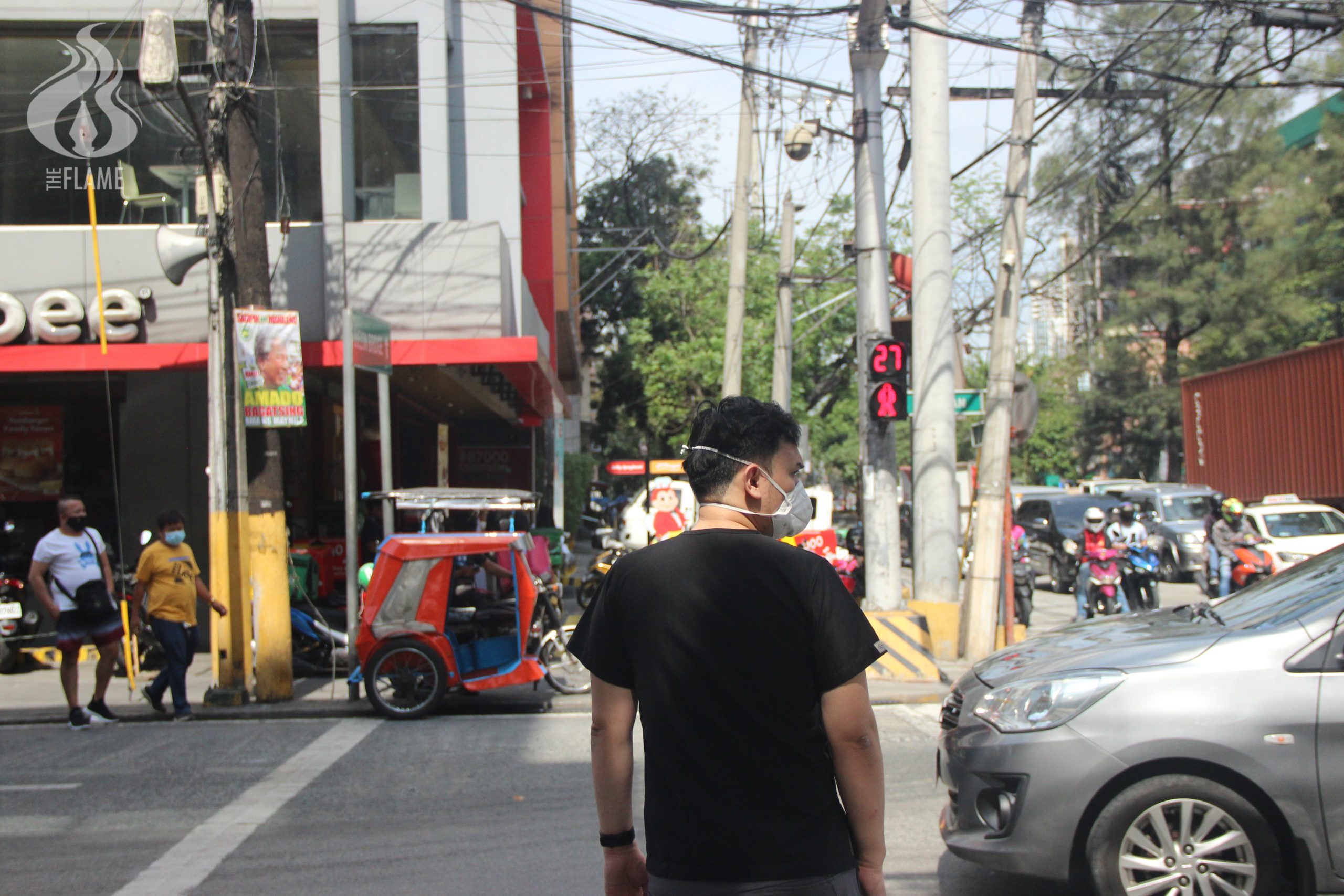
FIVE MONTHS after the start of the nationwide lockdown in 2020, John Lloyd Rolea, a political science junior, saw the impact of the pandemic on several businesses when he went to the University to return some books in the library.
“Numerous stores were closed because UST students were no longer present around the area to patronize their food or products,” Rolea told The Flame.
“It was completely different because UST [University of Santo Tomas] is not UST without its students,” he added.
Just this year, Rolea went back to the University and witnessed the stark difference in the state of the businesses around the campus compared to two years ago.
“Some businesses are now recovering from the devastating effects of the pandemic. Stores are now gradually reopening due to limited face-to-face classes,” Rolea said.
He said a number of stores like Dimsum Treats, Tiger Winx, and other printing shops have resumed their operations. Rolea also “noticed that there are new businesses which were not established during the pre-pandemic which are now operating around UST.”
Small businesses around UST would experience partial recovery once the limited face-to-face classes are implemented but it won’t be the same as it used to be, an expert said.
Asst. Prof. Imelda Angeles of the UST Department of Financial Management said in-person classes would open possibilities for small businesses to recuperate from the pandemic losses.
However, students cannot resume yet their normal activities and these have repercussions especially to micro, small, and medium enterprises (MSMEs).
“For one, it’s not 100 percent opening, there will be a hybrid of educational systems, unlike before, students are in school Monday to Saturday,” Angeles, whose research interests include micro and small enterprises, told The Flame.
During the first term of the academic year, the University said it may apply for limited face-to-face classes before December 2021 with the Faculty of Arts and Letters saying it would consider prioritizing the senior years of the communication and journalism programs for in-person learning. The plans were halted by the surge caused by the Omicron variant from late-December to early-February.
Despite the downward trend in infections and the easing of Metro Manila to the most relaxed Alert Level 1, UST is still not keen on holding face-to-face classes for all programs this term.
Slightly better
Kooyah Copy Center in Asturias Street, a popular printing shop among the Artlets and law students, is one of the businesses that benefited from the easing of restrictions.
“At the moment, I cannot feel the improvements yet because students still rarely go here at Kooyah. But the situation is better now compared to the start of the pandemic) Rick Regis, a sales representative, said in Filipino.
During the onset of the health crisis, the copy center was only open for three days a week because owners were unsure if there would be customers. Kooyah’s sales have since improved slightly as it now operates from Monday to Saturday.
Angeles said that while the holding of in-person classes is possible when cases dip, there is a high chance that online learning would persist, a scenario that would have a lasting impact on the MSMEs around the campus.
“Businesses will be able to start anew but it may take a while to get back to their former success,” she said.
Comfort space
Nicole Astudillo, a legal management freshman, recalled the feeling of comfort she once knew before the pandemic struck businesses in UST.
“Pre-pandemic, when you’re eating outside, para kang nakawala sa kulungan (it’s as if you got out of imprisonment) because after a stressful and super tiring day, you’re able to eat, refresh, and rest with your friends,” Astudillo told The Flame.
However, when she visited the areas surrounding UST recently, she noticed that while businesses are starting to recover, the “noisy yet fun vibe” was gone.
“It feels like the pandemic stole the very essence of businesses — to provide a comforting space for Thomasians),” Astudillo said.
Since they are facing an uncertain fate, MSMEs are left with no choice but to adjust.
Food establishment Heaven’s Touch Cuisine located in Asturias Street faced a major setback during the pandemic but was able to bounce back because of the helping hand given by its patrons from the Thomasian community.
“We closed our Asturias branch because of the pandemic. And then after quite some time, Thomasians initiated a fundraising for us, so we were able to come back) Reggie Piadoche, a co-owner of Heaven’s Touch Cuisine, told The Flame.
“During the start of the pandemic we really do not have many customers, but now, given the fact there is an easing of restrictions, most of the establishments around V. Concepcion Street opened,” he added.
To stay afloat, Heaven’s Kitchen had to join businesses that are accepting deliveries online. Piadoche admitted struggling to cope with the new scheme since the prices of the eatery’s products range from P50 to P100 while the delivery costs P80 to P100.
He acknowledged that the set-up is uneconomical and unwise especially for those who are trying to be frugal in these trying times.
“That is all we can have as a mindset. If someone eats, then thank you. If no one does, then we cannot do anything,” Piadoche said.
Government aid
Unfortunately, not all establishments were able to cope with the effects of the pandemic.
Chiquitos, a popular food establishment among Thomasians closed its second and last branch in Laon Laan on Nov. 19, 2020. It also ceased shuttered its G. Tolentino branch in July of the same year.
Regis hopes the government will provide a starting capital for all the businesses that closed so they could start over again.
The government, Angeles said, is supporting struggling MSMEs through programs like the Bayanihan COVID-19 Assistance to Restart Enterprises (CARES). Under CARES, struggling businesses may access financial assistance through state-run Small Business Corp.
However, the documentation and processing requirements tend to discourage business owners from tapping the assistance, she noted.
“Bayanihan programs help those who have borrowings from the bank and other financial institutions, but those who do not have loans, are not able to benefit from these,” Angeles said.
Angeles said streamlining the requirements for financial assistance could help businesses recover. Providing them tax relief would also be helpful, she added.
“In some countries, tax relief is beneficial to small business owners. In our country, payment of taxes was just moved or extended,” Angeles said.
Hopeful
Before the uptick of cases last January, Angeles warned that while there is a slow expansion of mobility “it may not be the same yet [for businesses].”
Regis is hopeful that Kooyah Copy Center will regain its former vitality. However, he is worried that another surge in COVID-19 infections would bring back the difficulties experienced during the lockdown.
“If that happens, our sales would decline, my salary would also decrease,” he said.
Angeles said business in the new normal is “a matter of survival and not profitability.” This trend is being experienced by Heaven’s Touch Cuisine, as its owners are just after meeting the break-even point.
Piadoche said he would be happy if he has enough income to pay bills, loans, and rent and to put food on the table everyday.
As the economy is still reeling from the effects of the pandemic, MSMEs, which account for the bulk of the country’s employment, are not yet seeing the light at the end of the tunnel.



